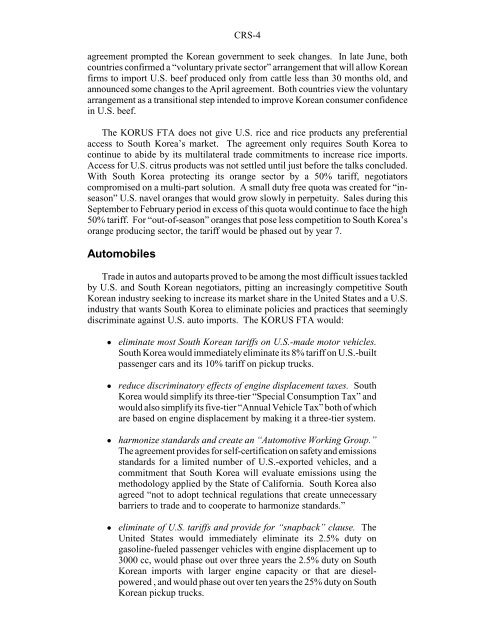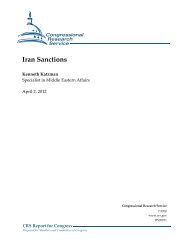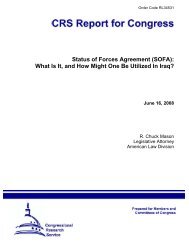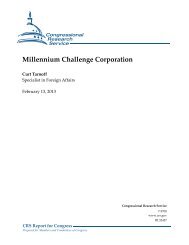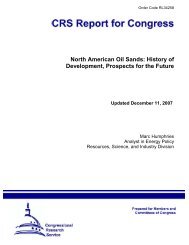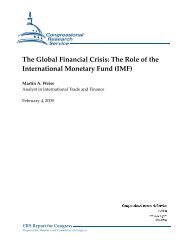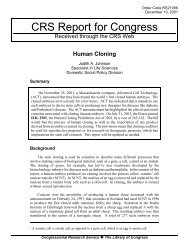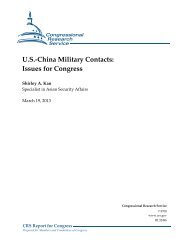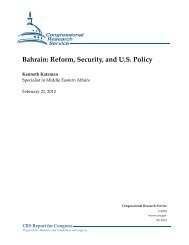The Proposed U.S.-South Korea Free Trade Agreement (KORUS ...
The Proposed U.S.-South Korea Free Trade Agreement (KORUS ...
The Proposed U.S.-South Korea Free Trade Agreement (KORUS ...
- TAGS
- korea
- fpc.state.gov
You also want an ePaper? Increase the reach of your titles
YUMPU automatically turns print PDFs into web optimized ePapers that Google loves.
CRS-4<br />
agreement prompted the <strong>Korea</strong>n government to seek changes. In late June, both<br />
countries confirmed a “voluntary private sector” arrangement that will allow <strong>Korea</strong>n<br />
firms to import U.S. beef produced only from cattle less than 30 months old, and<br />
announced some changes to the April agreement. Both countries view the voluntary<br />
arrangement as a transitional step intended to improve <strong>Korea</strong>n consumer confidence<br />
in U.S. beef.<br />
<strong>The</strong> <strong>KORUS</strong> FTA does not give U.S. rice and rice products any preferential<br />
access to <strong>South</strong> <strong>Korea</strong>’s market. <strong>The</strong> agreement only requires <strong>South</strong> <strong>Korea</strong> to<br />
continue to abide by its multilateral trade commitments to increase rice imports.<br />
Access for U.S. citrus products was not settled until just before the talks concluded.<br />
With <strong>South</strong> <strong>Korea</strong> protecting its orange sector by a 50% tariff, negotiators<br />
compromised on a multi-part solution. A small duty free quota was created for “inseason”<br />
U.S. navel oranges that would grow slowly in perpetuity. Sales during this<br />
September to February period in excess of this quota would continue to face the high<br />
50% tariff. For “out-of-season” oranges that pose less competition to <strong>South</strong> <strong>Korea</strong>’s<br />
orange producing sector, the tariff would be phased out by year 7.<br />
Automobiles<br />
<strong>Trade</strong> in autos and autoparts proved to be among the most difficult issues tackled<br />
by U.S. and <strong>South</strong> <strong>Korea</strong>n negotiators, pitting an increasingly competitive <strong>South</strong><br />
<strong>Korea</strong>n industry seeking to increase its market share in the United States and a U.S.<br />
industry that wants <strong>South</strong> <strong>Korea</strong> to eliminate policies and practices that seemingly<br />
discriminate against U.S. auto imports. <strong>The</strong> <strong>KORUS</strong> FTA would:<br />
! eliminate most <strong>South</strong> <strong>Korea</strong>n tariffs on U.S.-made motor vehicles.<br />
<strong>South</strong> <strong>Korea</strong> would immediately eliminate its 8% tariff on U.S.-built<br />
passenger cars and its 10% tariff on pickup trucks.<br />
! reduce discriminatory effects of engine displacement taxes. <strong>South</strong><br />
<strong>Korea</strong> would simplify its three-tier “Special Consumption Tax” and<br />
would also simplify its five-tier “Annual Vehicle Tax” both of which<br />
are based on engine displacement by making it a three-tier system.<br />
! harmonize standards and create an “Automotive Working Group.”<br />
<strong>The</strong> agreement provides for self-certification on safety and emissions<br />
standards for a limited number of U.S.-exported vehicles, and a<br />
commitment that <strong>South</strong> <strong>Korea</strong> will evaluate emissions using the<br />
methodology applied by the State of California. <strong>South</strong> <strong>Korea</strong> also<br />
agreed “not to adopt technical regulations that create unnecessary<br />
barriers to trade and to cooperate to harmonize standards.”<br />
! eliminate of U.S. tariffs and provide for “snapback” clause. <strong>The</strong><br />
United States would immediately eliminate its 2.5% duty on<br />
gasoline-fueled passenger vehicles with engine displacement up to<br />
3000 cc, would phase out over three years the 2.5% duty on <strong>South</strong><br />
<strong>Korea</strong>n imports with larger engine capacity or that are dieselpowered<br />
, and would phase out over ten years the 25% duty on <strong>South</strong><br />
<strong>Korea</strong>n pickup trucks.


